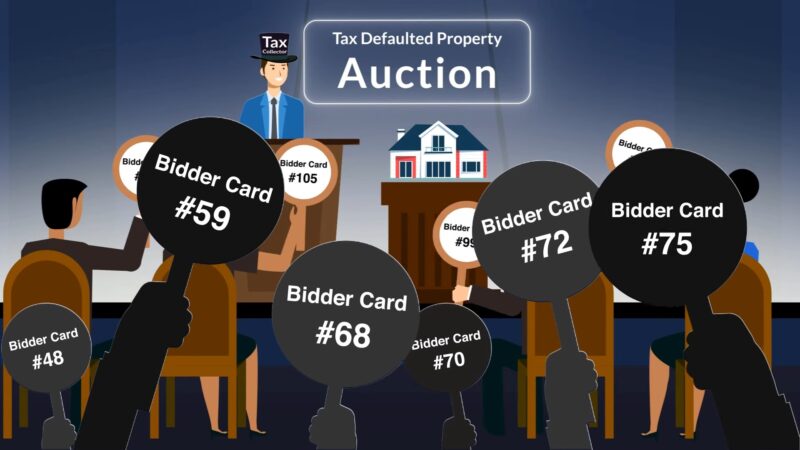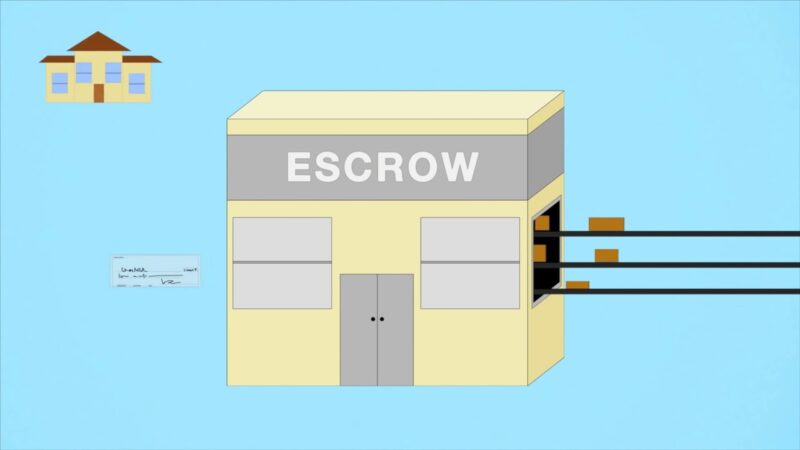Property taxes are annual or semi-annual payments that homeowners make to the local government based on the assessed value of their property. Property taxes fund essential public services, such as schools, libraries, roads, and parks.
However, if homeowners fail to pay their property taxes on time, they may face serious consequences, such as liens, tax sales, and foreclosure. In this article, we will explore the risks of not paying property taxes and how to avoid losing your home.
What are the Steps Involved in a Tax Sale?

Property owners who don’t pay taxes can face two options: tax deed sales and tax lien certificate sales, which vary by state. In a tax deed sale, the property is auctioned to the highest bidder by the authority, making it the new owner.
The original homeowner loses rights unless they redeem it within a specific time frame, typically one to three years, common in states like California, Texas, and Florida. In a tax lien certificate sale, the property’s lien is sold to an investor who pays overdue taxes and obtains a certificate.
Investors earn interest, sometimes up to 36% yearly. Homeowners maintain ownership but must repay the investor, including interest and costs, to remove the lien.
Failure leads to foreclosure. These sales are prevalent in states like Arizona, Illinois, and New Jersey, with redemption periods from six months to three years.
The tax sale process has pros and cons for all parties. Taxing authorities streamline tax collection and avoid property costs, buyers benefit from affordable property acquisition or high returns, while homeowners risk property loss but may redeem and clear their debt.
What Affects the Redemption Price of a Property?
Homeowners can reclaim their property after a tax sale by paying the sale amount, interest, and costs within a specific timeframe, safeguarding against property loss due to financial difficulties or unfair tax sale practices. The redemption period varies based on factors like sale type, state laws, and property characteristics.
In tax deed sales, it differs by state, ranging from two years in Texas and Georgia to only before the sale in California and Florida. In tax lien certificate sales, it typically follows the sale but varies by state, like three years in Arizona or just six months for abandoned or vacant properties.
To exercise redemption rights, homeowners must fully repay the sale amount, interest, and costs, notifying the buyer and taxing authority with proof of payment. Failure forfeits their rights, making the buyer the permanent property owner.
For homeowners seeking redemption, prompt action and adherence to procedures are vital. Consulting a real estate or tax attorney can help navigate their rights, negotiate with the buyer, and prevent fraud or errors.
What is Lien Priority and Why is it Important?

Lien priority determines the order of debt payment, affecting the rights of lienholders and homeowners during property sales or foreclosures. Property tax liens usually come first, requiring payment before mortgages.
This means if delinquent property taxes lead to a sale or foreclosure, the taxing authority gets paid first, potentially leaving the mortgage lender unpaid, erasing their lien, and limiting their recourse. However, some states differ in lien priority rules. In places like New York and Pennsylvania, mortgage liens precede property tax liens, ensuring mortgage lenders are paid first in such situations.
Lien priority carries implications for lenders’ risk and returns, as well as homeowners’ property equity and liability. Therefore, understanding state lien priority rules is essential for both parties involved in the tax sale process.
How Can a Business Use Surplus Profits?

Surplus profits arise when a tax sale yields more money than the delinquent taxes, interest, and costs. For example, if a property valued at $200,000 has a $10,000 tax debt and sells for $150,000, the surplus profit is $140,000.
Ownership of surplus profits sparks legal and ethical debates. The government asserts them as a result of their tax sale process, while homeowners argue they stem from the property’s value and equity.
States have differing surplus profit policies. Texas and Florida permit homeowners to claim surplus profits within one to two years.
California and Illinois mandate the taxing authority to notify homeowners and offer a six-month to one-year claim window. In contrast, New Jersey and Ohio allow the taxing authority to retain surplus profits unless homeowners file a lawsuit challenging the sale within one to two years.
In 2022, the U.S. Supreme Court, in Tyler v. Hennepin County, ruled that government retention of surplus profits violates homeowners’ constitutional rights. The Court declared surplus profits as homeowners’ property, requiring just compensation and due process before the government can seize them.
How Can a Dispute Over Refunds and Compensation Be Resolved?
Refunds and compensation aim to rectify homeowners’ equity losses due to tax sales. Eligibility varies by state and requires homeowners to demonstrate:
- Paying delinquent taxes, interest, and costs before the sale, despite taxing authority or buyer errors or delays.
- Overcharging by the buyer post-redemption, due to miscalculations or fraud.
- Lack of proper notice or due process hindering tax payment or property redemption.
- Unrecognized exemptions (disability, senior citizen, veteran, low-income status).
- Hardships like natural disasters, public emergencies, death, divorce, or job loss affect tax payment or property redemption.
To claim, homeowners must file with the taxing authority or court within one to two years after the tax sale, providing evidence like receipts, invoices, affidavits, and notices. Legal help, especially from a real estate or tax attorney, can assist in the process.
Refunds and compensation can aid homeowners in recovering lost funds from tax sales but aren’t guaranteed, depending on fund availability, authority or court discretion, and litigation outcomes.
What is Mortgage Lender Intervention?
Mortgage lender intervention occurs when lenders pay homeowners’ overdue property taxes and add the amount to the loan balance. It has both benefits and drawbacks for homeowners.
Benefits include avoiding tax sales and foreclosures as the lender settles the tax debt and removes the property lien. Drawbacks involve increased debt and monthly payments, potentially leading to foreclosure if homeowners struggle to pay.
Rules vary by state, with some requiring lender notification (e.g., New York and Pennsylvania) and others allowing lenders to settle taxes without notice (e.g., California and Florida). Certain states (e.g., Texas and Georgia) limit the amount and frequency of taxes lenders can cover.
Homeowners with mortgages should understand the implications of mortgage lender intervention. Comprehending loan terms, state regulations, and open communication with lenders is essential.
Negotiating payment plans or loan modifications can help in cases of financial difficulty.
What is an Escrow Account and How Does it Work?

Escrow accounts, also known as impound or reserve accounts, are tools used by mortgage servicers to manage property taxes, insurance, and maintenance expenses for borrowers, ensuring timely and complete payments. Homeowners encounter both benefits and drawbacks with escrow accounts.
On the positive side, they offer convenience and peace of mind by consolidating and guaranteeing on-time payments, protecting against tax sales and foreclosures. However, escrow accounts may increase monthly payments and closing costs for homeowners, with servicers imposing fees and interest. Errors and disputes can arise if servicers miscalculate expenses, leading to payment adjustments.
Regulations for escrow accounts vary by state. Some require servicers to pay interest on the escrow account balance to homeowners (e.g., New York and Pennsylvania). Others mandate annual statements and analyses (e.g., California and Florida).
Some states allow homeowners meeting specific criteria (e.g., low loan-to-value ratio or good payment history) to opt out of escrow accounts (e.g., Texas and Georgia). Understanding the implications of escrow accounts is essential for homeowners with mortgages.
Awareness of the pros and cons, along with state laws governing these accounts, is vital. Regularly monitoring escrow account statements and reports and reaching out to the servicer with questions or concerns is advisable.
What is a Legal Consultation and Why is it Important?

Homeowners turn to real estate or tax attorneys for legal consultation on property tax issues and tax sales in specific states. It empowers them to understand their rights, safeguard their interests, and resolve problems.
Benefits of legal consultation for homeowners dealing with property tax problems and tax sales:
- Reviewing property tax bills and notices for accuracy and validity.
- Negotiating with the taxing authority or buyer for payment plans, waivers, reductions, or debt cancellations.
- Initiating protests, appeals, or lawsuits to challenge tax assessments, the tax sale process, or outcomes.
- Pursuing refunds, compensation, or surplus profits to recover lost funds due to tax sales.
- Exercising redemption rights to reclaim the property after a tax sale by paying the sale amount, interest, and costs.
- Managing mortgage lender intervention and escrow accounts, negotiating loan modifications, or foreclosure prevention plans.
However, legal consultation can be costly and time-consuming, with lawyers charging fees and the process potentially lasting months or years. Understanding the benefits, costs, and state laws is crucial for homeowners dealing with property tax issues and tax sales.
Seeking guidance from qualified and experienced real estate or tax attorneys is key to navigating these challenges effectively.
FAQ
How can I challenge my property tax assessment if it’s not accurate?
If you feel your property tax assessment is too high, you can dispute it. Each state has its process for this. You’ll need to show evidence that your property is valued lower compared to similar ones nearby. A real estate attorney familiar with your state’s rules can assist you.
What are the consequences of missing a property tax payment?
Failing to pay property taxes on time leads to accumulating late fees and penalties. You’ll receive notices urging you to pay, or face more severe consequences. Ignoring these could result in a lien on your property, possibly leading to a tax sale or foreclosure.
In what ways can I get surplus profits from a tax sale?
The rules for claiming surplus profits from a tax sale differ from state to state. Some states will automatically send you a refund, while others will require you to file a claim within a certain period. You should research your state’s specific policies to know your rights.
What are the legal options to challenge the outcome of a tax sale?
If you think that there were errors or unfair practices during the tax sale process, you can seek legal remedies. This may include filing appeals, lawsuits, or requesting refunds or compensation. A lawyer who specializes in property tax issues can help you explore your options.
Final Words
In summary, timely property tax payment is crucial for funding public services and avoiding serious consequences like liens, tax sales, and foreclosure. Throughout this article, we explored these risks and provided valuable insights into various aspects, including tax sale processes, redemption rights, lien priorities, surplus profits, refunds, compensation, mortgage lender intervention, escrow accounts, and legal consultations, all of which hold unique importance based on state-specific regulations.
Our main goal was to empower homeowners with knowledge and practical advice, enabling them to effectively navigate property tax challenges and secure their homes.
